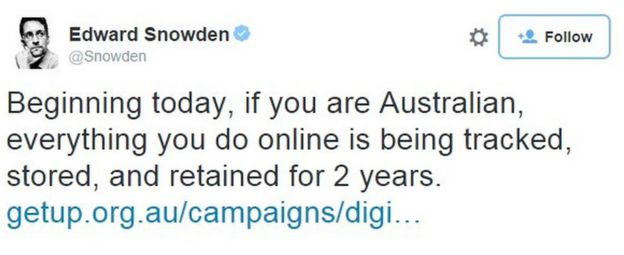Australia begins mass data retention under the new law
Starting today, every phone call you make, every text message you send and every email you write will compulsorily be tracked by the Australian government agencies under a new metadata retention scheme. The Australian government’s new data retention laws which come into effect from today will mandate the ISPs and telecom providers to keep a large amount of your telecommunications metadata for two years.
In black and white this means that if you are a citizen of Australia with a mobile phone and an Internet connection, your every digital activity will be compulsorily recorded by authorities.
The new metadata retention law has allegedly been implemented to protect the country against organized terrorists and criminals. However, from an Australian citizen’s standpoint, it seems that the government will have access to every digital activity done by them. This new scheme vastly expands the retention of personal data, which has triggered a debate among Australians as it is a major invasion of privacy.
Table Of Contents
What data will be collected
Up until now, though data was collected, the data retention by mobile phone and Internet providers was inconsistent due to government policies. As of date data about who called or texted whom was generally stored by major companies for billing purposes only. Now, with the implementation of the new metadata retention policy, such and much more data will be collected and stored for a mandatory period of 2 years.
What Phone Data is Retained?
- Who you called
- Who you texted
- Missed numbers
- Time and Date of calls and SMS
- Duration of calls
- Your Location at the time of call or SMS
- Device data
What Internet Data is Retained?
- Your IP address
- Location and geographical data
- The volume of your uploads and downloads
- Time and duration of your web connections
- Your email data including emailed Date, Time and Attachment data volumes (If you use an Australian email service)
- While not mandatory, some internet providers may record the IP address of the sites you visit, mainly your Internet history
To assuage the feelings of privacy loves, the Australian government has come out with a detailed FAQemphasizing that the type of data collected is only Metadata, and not the content of calls and messages. Opponents point out that, considered in entirety, such metadata gives an accurate picture of a user’s digital life violating his/her privacy.

A post on iiNet says that“If you have the metadata, you have the content.”
The bill was introduced to the Australian parliament when current Prime Minister Malcolm Turnbull was communications minister. He said then it was “critical” for security agencies and law enforcement, citing investigations into domestic terrorism.”No responsible government can sit by while those who protect us lose access to vital information, particularly in the current high threat environment,” he said, in a joint statement with Attorney-General George Brandis.
How can an Australian escape this metadata retention scheme
If you are an Australian citizen and value your privacy very much you can try few of the workarounds we have given below.
- Instead of using the cellular network, use free apps to make calls or send text messages. For e.g.,
- TextSecure for encrypted text messaging, RedPhone for encrypted phone calls and Signal for both encrypted messaging and phone calls.
- Use Virtual Private Networks (VPNs) that help hide your Internet traffic by encrypting the connection. Kindly check our article on the top VPN providers.
- Use non-Australian email, video, and social media platforms, such as Gmail, Hotmail, Facebook, and Skype, as these are exempted from some of the data retention requirements. (Note: Government will be able to see that you use these services, but they won’t know whom you’re talking to)
- Use Public Wi-Fi hotspots. The public hotspots are not included in the data retention scheme however it can be risky to use public WiFi hotspots.

